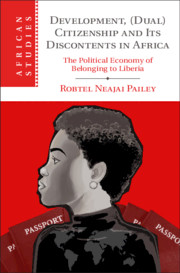 Development, (Dual) Citizenship and Its Discontents in Africa
Development, (Dual) Citizenship and Its Discontents in Africa Book contents
- Development, (Dual) Citizenship and Its Discontents in Africa
- African Studies Series
- Development, (Dual) Citizenship and Its Discontents in Africa
- Copyright page
- Contents
- Figures and Tables
- Acronyms
- Acknowledgements
- Introduction
- 1 Methodological, Theoretical, and Biographical Reflections
- 2 The Political Economy of Belonging to Liberia
- 3 Dual Citizenship and Its Discontents in Africa
- 4 Give Me Your Land or I’ll Shoot!
- 5 Between Rootedness and Rootlessness
- 6 The Dichotomy of Diasporic Developmentalism
- Conclusion
- Book part
- References
- Index
- African Studies Series
2 - The Political Economy of Belonging to Liberia
Published online by Cambridge University Press: 07 January 2021
- Development, (Dual) Citizenship and Its Discontents in Africa
- African Studies Series
- Development, (Dual) Citizenship and Its Discontents in Africa
- Copyright page
- Contents
- Figures and Tables
- Acronyms
- Acknowledgements
- Introduction
- 1 Methodological, Theoretical, and Biographical Reflections
- 2 The Political Economy of Belonging to Liberia
- 3 Dual Citizenship and Its Discontents in Africa
- 4 Give Me Your Land or I’ll Shoot!
- 5 Between Rootedness and Rootlessness
- 6 The Dichotomy of Diasporic Developmentalism
- Conclusion
- Book part
- References
- Index
- African Studies Series
Summary
Chapter 2 employs the unique backstories of respondents interviewed for this book to begin to identify the twenty-first century features of Liberia’s political economy of belonging. It demonstrates that contemporary constructions of Liberian citizenship are part of a continuum—moving from passive, identity-based citizenship emphasising rights and entitlements (and based on birthplace, bloodline, and blackness) to more active, practice-based citizenship privileging duties and responsibilities—thereby transcending the legal definition enshrined in the country’s 1973 Aliens and Nationality Law and 1986 Constitution at least until mid-December 2019. While homeland Liberians embody citizenship practices that are domestically rooted and territorially confined to Liberia, diasporas and returnees engage in transnational pursuits that attempt to positively alter citizen-citizen and government-citizen relations abroad and within Liberia. The chapter also shows that relations between the Liberian government and diasporas have been strengthened or weakened depending on the levels of engagement of embassies and the immigration status of nationals abroad. Whereas the homeland state provided limited to no privileges/protections to nationals abroad in London, Washington, Freetown, and Accra, thus shirking its role in the political economy of belonging, Liberians abroad implied that they had more meaningfully fulfilled duties/obligations through their varied individual and collective efforts.
Keywords
- Type
- Chapter
- Information
- Development, (Dual) Citizenship and Its Discontents in AfricaThe Political Economy of Belonging to Liberia, pp. 50 - 83Publisher: Cambridge University PressPrint publication year: 2021


